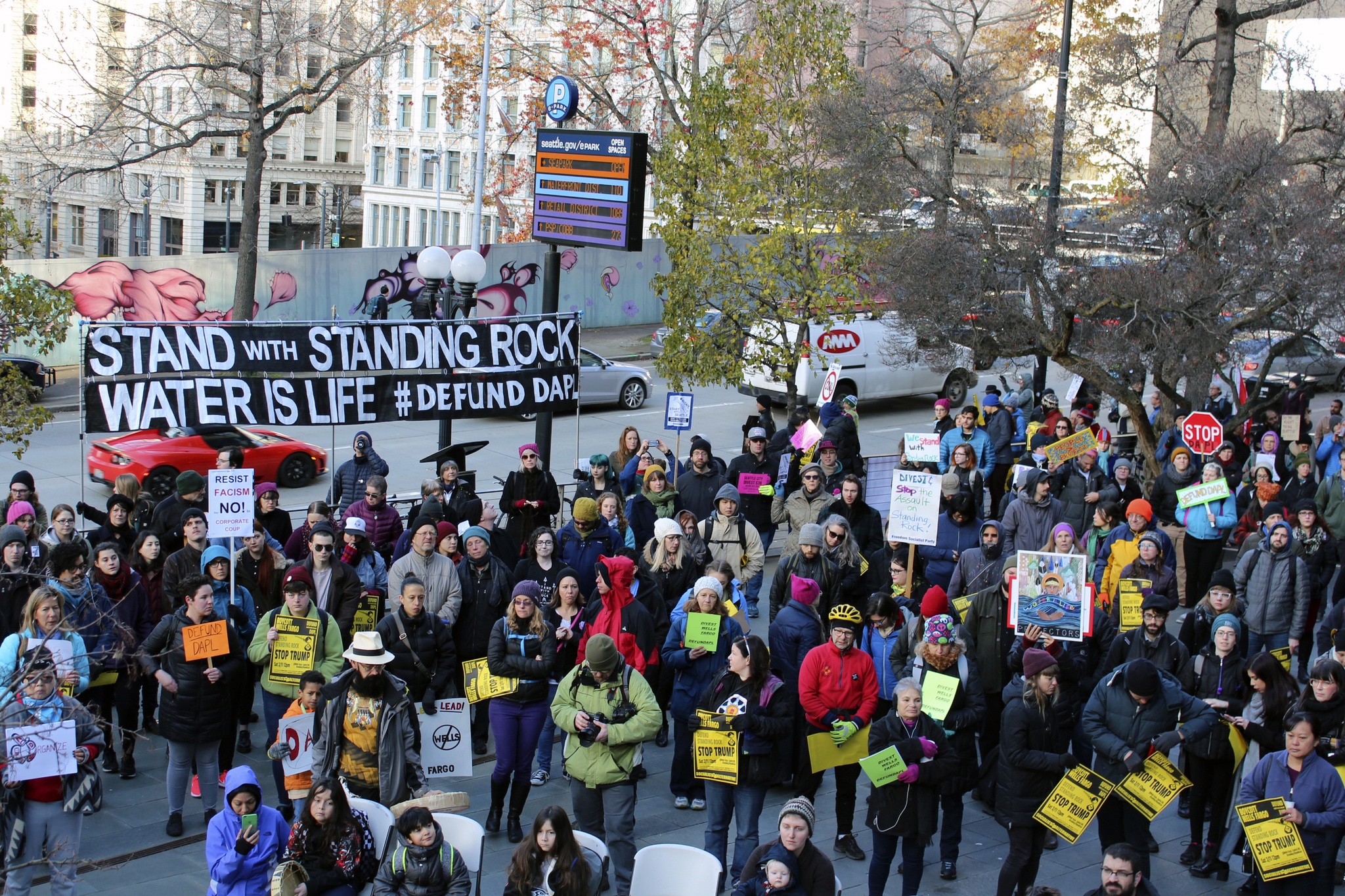The Seattle City Council voted unanimously on Tuesday to end the city’s contract with Wells Fargo once it lapses in late 2018. That means that Seattle is now the first major city in the nation to have decided to move its money from a financial institution in part due to its ties with the Dakota Access Pipeline.
Even before the vote — which was certainly expected — public comment was stacked with heartfelt thanks, including a short song and presentation from local tribes. “Give us the opportunity to honor you,” said Rachel Heaton, Muckleshoot tribal member, Duwamish descendant, and among the lead organizers on the Defund DAPL Seattle Action Coalition. She presented each Councilmember with a gift: a rock, a bottle of sacred water, cedar, sage, and lavender. “In our culture, we believe those allies and those people that work with us… we honor them,” she said. “Even though I realize the vote hasn’t taken place yet… the fact that we’re standing here and having this conversation shows how far we’ve come. On behalf of the Native American community, we’d like to honor all nine of you today.”
Following the public comment period and a discussion of various amendments, Council President Bruce Harrell opted to go to a vote before every Councilmember made his or her comments, simply because “we all know we’re going to pass this.” And when the defining moment arrived in a chorus of “ayes,” the room erupted. “Mni wiconi! Water is life!”
Defund DAPL activists, in Seattle and across the country, now see the city as a clear beacon of progressive resistance, and an obvious way to urge other cities to follow suit.
If you want to see how we make change happen, please watch Seattle VERY CLOSELY today. This is how we make change happen#StartWithSeattle https://t.co/8GbRLzx62i
— Shaun King (@ShaunKing) February 7, 2017
And not a moment too soon, for those battling the pipeline: The U.S. Army Corps of Engineers announced earlier on Tuesday that it would again grant the easement needed for the project — what many are calling its “final bureaucratic hurdle.” In its decision, the Army cited President Donald Trump’s memorandum urging the agency to expedite the approval process. Attorneys and activists maintain that the fight is far from over. “Expect mass resistance far beyond what Trump has seen so far,” said Tom Goldtooth, executive director of the Indigenous Environmental Network, in a statement.
“I am from Standing Rock and I thank you for bringing this ordinance forward,” local activist Matt Remle told the Council, prior to the vote. “It’s a mixed blessing,” he said, pointing to the Army’s decision, but “Seattle has the opportunity, you all have the opportunity, to send that immediate response, and say, ‘No, we’re opposing this pipeline and standing up to the Trump administration.’”
The $3 billion in question — which is the amount of money that moves in and out of Seattle’s Wells Fargo accounts over the course of a year, not the amount sitting there at any given time — will need to find a new home by the end of 2018. Per the city’s new ordinance, the requirement is to find a financial institution that engages in socially responsible banking practices, which include making sure there are no fake-account scandals or oil pipeline-funding blots on its record, among other things.
But the ordinance also strengthens Seattle’s criteria for socially responsible business practices, period — not only with banks, but with any company applying for a city contract. It builds on work the City has been doing for some years now, including during the Occupy Wall Street movement in 2011, when the Council adopted a resolution around socially responsible investments, and last fall, when the Council and Mayor Ed Murray opted to cancel a $100 million bond-financing deal with Wells Fargo, following the fake-account scandal. In a letter dated October 6, 2016, Murray, Harrell, and Councilmember Tim Burgess stated that “The City and its taxpayers must trust the practices and the integrity of the institutions that handle our public funds.”
The city has time to figure out where to move its money, but that’s still unclear. Following the vote, Councilmember Mike O’Brien reiterated his hope that Washington will create its own public bank — and pointed out that a legislative hearing has been scheduled for SB 5464 on Thursday morning at 8 a.m. “What we did today was a great step forward,” he said. “We need to continue that, and replace [Wells Fargo] with a bank that shares our values.”
While Councilmembers voiced their personal approval of all of the things the legislation stands for, they also took care to thank the activists who made it such a huge priority.
“The leaders here in the local community put the fire under us,” said Harrell. “For that, we thank you. We are better public servants as a result of your leadership. Thank you.”
On their way out the door, activists’ shouts of “When we fight, we win!” interrupted the last few minutes of the meeting.








